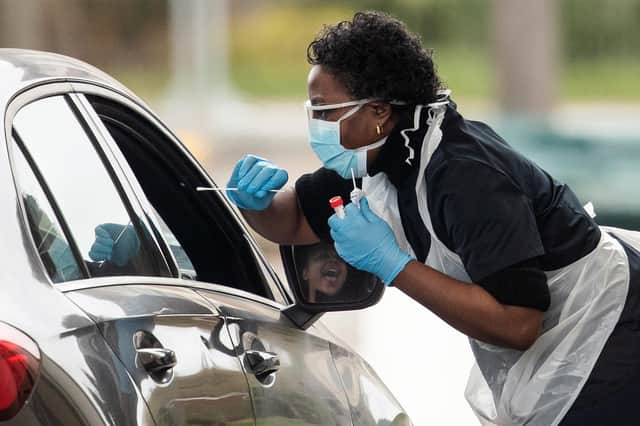Covid in Scotland: Inequality continues to cause ethnic minorities to be disproportionately affected by virus – Dr Gwenetta Curry


Almost four million people across the country have rolled up their sleeves to get the double jab with the hopes of being able to safely spend the holidays with their loved ones.
On November 29, the first case of the new Omicron variant was found in Scotland and, as of December 14, there were 296 cases.
Advertisement
Hide AdAdvertisement
Hide AdThis new variant of concern douses the hopes of people across Scotland, as mitigating efforts are put in place to help reduce the spread of the virus. Scientist are continuing to gather more information to determine if this variant is more severe than the previous variants.
According to the World Health Organization, Omicron is spreading faster than previous variants but it is still unknown as to whether the severity has changed. Researchers around the world are continuing to conduct studies to better understand transmissibility and severity of the new variant.
As we continue to discuss the effect Covid has had and continues to have on vulnerable populations, there is a need to reflect on the current data.
Early in 2020, news of Covid’s disparate impact on ethnic minorities dominated the media and although the disparities have not been reduced there has been a serious reduction in coverage.
The latest Scottish government report indicated that between March 2020 and September 2021 deaths amongst people with Pakistani ethnicity were 3.7 times as likely to involve Covid as people with White Scottish ethnicity. Deaths amongst people with Chinese ethnicity were 1.7 times as likely, and three times as likely among people with Indian and other Asian ethnicity.
There was not enough data on the mortality of Black populations in Scotland to make a clear inference about Covid’s impact. The increase in cases will inevitably continue to disproportionately impact ethnic minorities, not only through mortality but also the knock-on effects, such as the decline in mental health among young people as well as the stress on NHS staff, which continues to be a major concern.
In efforts to combat the spread of the virus, it will be important that we do not lose sight of addressing the inequalities that have caused ethnic minorities to be disproportionately impacted by the Covid pandemic across the UK.
As the new wave sweeps across the country, structural inequalities must be taken seriously to ensure ethnic minorities do not continue to suffer at a rate higher than their white counterparts. Employment, housing, and food insecurities are disproportionately impacting ethnic minorities in the UK, which only adds to the stress and fears related to the virus.
Advertisement
Hide AdAdvertisement
Hide AdEquitable vaccine distribution will help reduce the risk of more virus mutations. The Global South has overwhelmingly been ignored in the distribution of the vaccine. Mutations easily occur when there are elevated levels of community transmission.
Currently, there is a major push to increase vaccine uptake across the UK as well as efforts to administer more booster jabs while other countries still struggle with access. It is clear this virus can not be fought in isolation, and it will take a global effort to reduce the spread.
Dr Gwenetta Curry is an Edinburgh University lecturer on race, ethnicity and health
A message from the Editor:
Thank you for reading this article. We're more reliant on your support than ever as the shift in consumer habits brought about by coronavirus impacts our advertisers.
If you haven't already, please consider supporting our trusted, fact-checked journalism by taking out a digital subscription.
Comments
Want to join the conversation? Please or to comment on this article.

